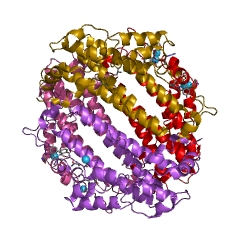TDO based Cancer Therapy
Tryptophan 2,6-dioxygenase (TDO) might be another interesting target for therapeutic vaccinations against both cancer cells and local immune paralysis in the tumor microenvironment. Creative Biolabs provides TDO vaccine development for cancer therapy. It is possible to restore Th1 response towards TD1 in cancer patients in the setting of a TDO-based therapeutic vaccine in which T cells are reactivated outside the tumor site.
Biological Function of TDO
Tryptophan 2,6-dioxygenase (TDO, also sometimes referred to as tryptophan oxygenase and L-tryptophan pyrrolase) belongs to the family of oxidoreductases, especially those that act on single donors with O2 as oxidant and incorporation of two atoms of oxygen into the substrate. This family includes tryptophan 2,3-dioxygenase and the closely related indoleamine 2,3-dioxygenase enzyme (IDO). Both TDO and IDO contain a non-covalently bound heme per monomer. IDO is monomeric while TDO is usually tetrameric. Tryptophan-2,3-dioxygenase physiologically regulates systemic tryptophan levels in the liver.

Fig.1 Cartoon representation of the molecular structure of protein registered with 1yw0 code.
TDO and Cancer
Degradation of tryptophan is an important phenomenon that inhibits anti-tumor immune responses, which is not only mediated by IDO. TDO is another enzyme involved in the degradation of tryptophan in the tumor microenvironment. Similar to IDO, TDO mRNA expression was also found in human tumors. The main factors affecting TDO expression and/or activity include sex steroid hormones and glucocorticoids. Upregulation of TDO results in a decrease in tryptophan and the accumulation of kynurenine and its metabolites. TDO is expressed in many cancers, including melanoma, breast cancer, glioma, NSCLC, hepatocellular carcinoma, and ovarian carcinoma.
TDO Vaccine
TDO-specific CD8+ and CD4+ T cells may exert immune regulatory functions by releasing cytokines, or even by killing target cells expressing TDO. Thus, both TDO-specific CD8+ and CD4+ anti-Tregs may play a role in regulating the immune response by directly inhibiting the immune-permissive state induced by cells expressing TDO, and indirectly suppressing the immune response by releasing pro-inflammatory cytokines. In contrast to human donors, the phenotype of the CD4+ TDO reactive T cells aer different in cancer patients. Therefore, the chronic inflammatory state of the tumor seems to influence the TDO-reactive T cells.
It is possible to restore Th1 response towards TD1 in cancer patients in the setting of a TDO-based therapeutic vaccine in which T cells are reactivated outside the tumor site. Hence, TDO may be another interesting target for therapeutic vaccination against local immune paralysis in cancer cells and tumor microenvironments.
Creative Biolabs is a leader in the field of vaccine development and has focused on the cancer vaccines for years. We have experienced experts and advanced platforms that are able to provide excellent services. If you are interested in our services, please contact us for more details.
All of our products can only be used for research purposes. These vaccine ingredients CANNOT be used directly on humans or animals.


